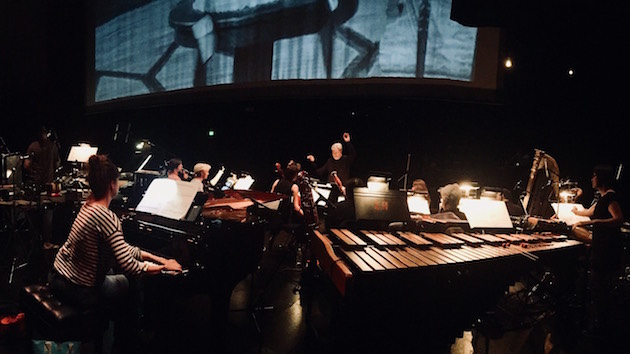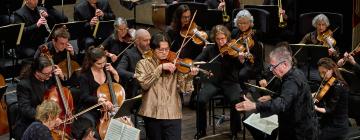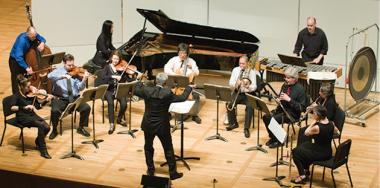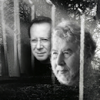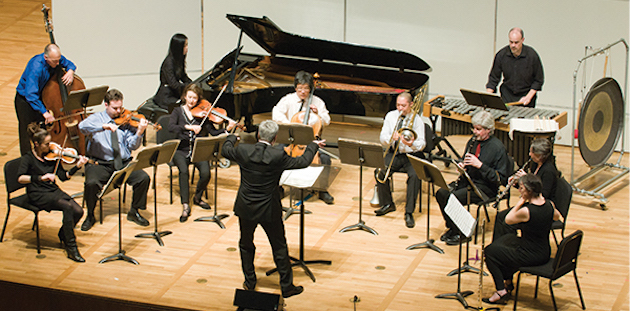
The New German School, the Second Viennese School, the New York School — these are some of the styles made to organize the decades of music history. On Saturday, during the Eco Ensemble’s program at Cal’s Hertz Hall, I imagined a future musicologist writing of the Berkeley School. The central feature? A focus on timbre and time.
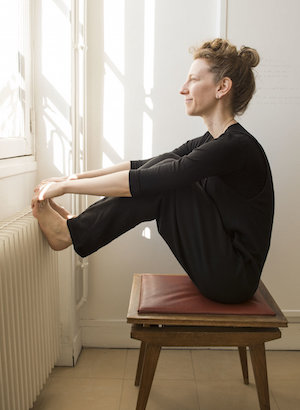
Take you’ll drown, dear, an atmospheric monodrama (soprano Ann Moss) by Sivan Eldar. Two sound-worlds illustrate an ambiguous narrative that exists on different planes.
It starts in darkness, the electronic sounds gradually becoming distinguishable from the rustling of an audience restless with anticipation. The speakers pop with watery blips, ones that blur with the guttural sounds Moss feeds into the mic. Her whispers morph into luxurious, almost rapturous singing.
The dualism echoes from the Rilke play (The White Princess) that loosely inspired the text, by Cordelia Lynn. To me, in fact, it’s like a contemporary Bluebeard’s Castle, where the crux of the story isn’t figuring out the man: It’s all about the woman’s inner life.
There are two sides, also, in Carmine Cella’s La mémoire de l'eau for large chamber ensemble (conducted by David Milnes). One is a kind of kaleidoscopic stasis; the other is quick and slippery. Gestures fling upwards, and the percussion rolls expectantly — but as soon as tension mounts, the unflappable music returns to its glassy state.
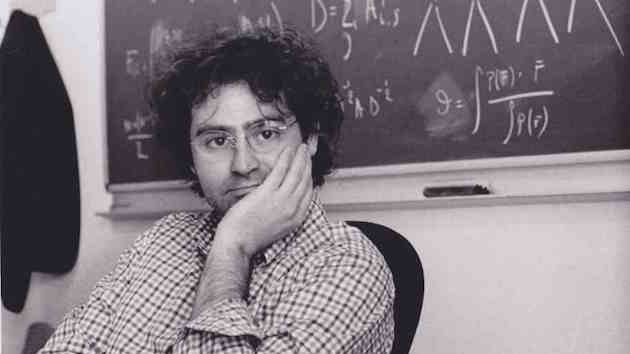
Or does it return? Cella, who was recently appointed as a Cal faculty member (the rest of the program’s composers are Cal graduates) writes that the work exists outside of linear time. But its short length facilitates comparative listening, and I can’t help but link each similar episode with my memory of what’s come before. Maybe I need one more listen to get it — while rereading my favorite Reinhart Koselleck essays on the concept of time.
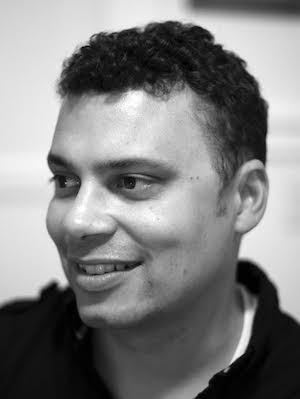
Then, there were two fast-paced, sharply focused works by Matthew Schumaker and Amadeus Regucera. Schumaker’s Nocte Lux for two cellos (Leighton Fong and Mosa Tsay) and bass (Richard Worn) was inspired by urban night photography, and I immediately see the neon trails. It’s a busy landscape created by three impulse-driven individuals, each of their lines — augmented by electronics — making a hurried footpath around those of the other musicians.
There’s a kind of 20th-century exoticism in the harmonies, at times — and then, in a flash, gritty sounds of feedback. The sense is of immense movement, and it’s a dizzying ride.
Less optimistically, Regucera’s RAW dramatizes the physicality of music-making: brutally, over and over again.
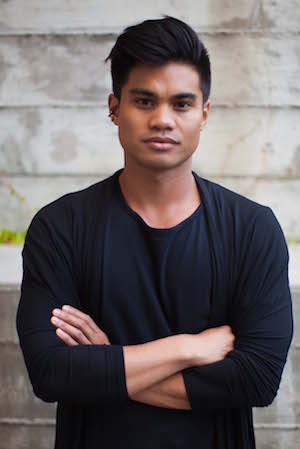
I play my instrument every day, and yet I newly notice the sheer labor of the musicians onstage. Constantly changing gestures inherently seem more involved than textures of sustained sameness — but it’s especially noticeable when the percussionist (Loren Mach) has to suddenly lean his entire body to hit the sticks on the rims of the drums, for example.
I notice the labor when it seems superfluous. The score, for large chamber ensemble, often sounds like it could be indeterminate (even the gorgeous homophony — a kind of jazzy pointillism — toward the end of the piece). Why kill yourself, then, to be accurate?
I notice the labor when it’s almost comically futile: the exaggerating blowing into the oboe (Kyle Bruckmann) and piccolo (Stacey Pelinka) with no pitched material as reward. The work is all there is. And if the concept sometimes feels thin (has Regucera tried Alexander Technique?) the piece itself overflows.
